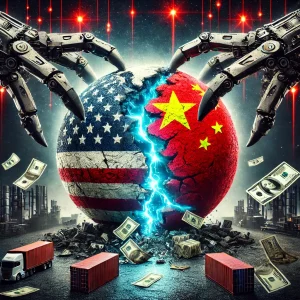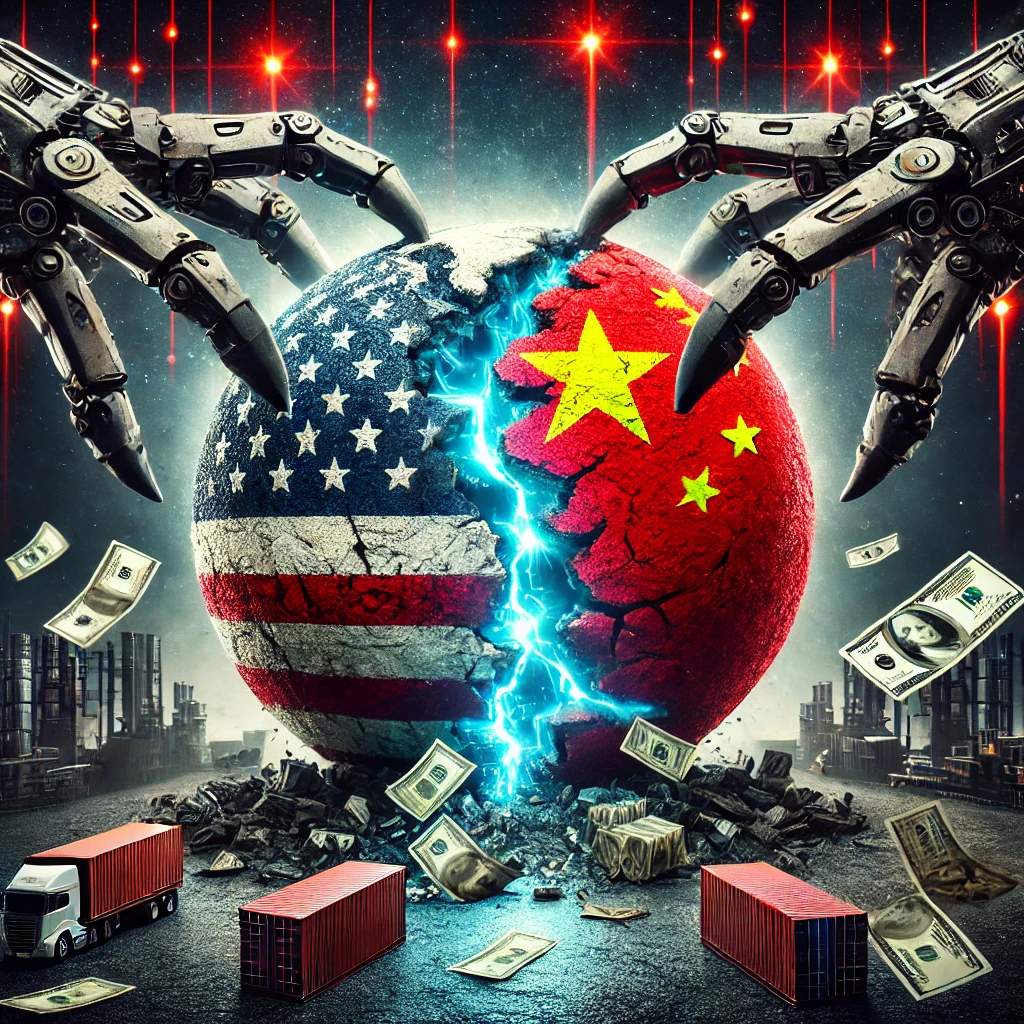Trump’s 10% Import Tariff Triggers Global Trade Tensions and Market Volatility”
عالمی تجارتی کشیدگیاں : امریکی صدر ڈونلڈ ٹرمپ کے تجارتی محصولات اور ان کے اثرات
Title : “Trump’s 10% Import Tariff Triggers Global Trade Tensions and Market Volatility”
Writer : Hina Shahid
Category : Article
Posted On : Hina Shahid Official
#TrumpTariffs
#GlobalTrade
#MarketVolatility
#TradeWar
#USPolitics
#ImportTariff
#EconomicTensions
#FinancialMarkets
#GlobalEconomy
#HinaShahidWrites
#BreakingNews
#TradePolicy
#StockMarketNews
#InternationalTrade
#EconomicImpact

“Global Trade Tensions: U.S. President Donald Trump has implemented significant trade tariffs, including a 10% baseline tariff on all imports, leading to market volatility and concerns about a potential global recession.”
Global Trade Tensions: U.S. President Donald Trump’s Trade Tariffs and Their Impact
In recent developments, global trade tensions have been escalating due to the policies introduced by the U.S. government under the leadership of President Donald Trump. One of the most notable moves has been the implementation of significant trade tariffs. This includes a 10% baseline tariff on all imports, a measure aimed at reducing the trade deficit and protecting American industries.
The Rise of Trade Tariffs
President Trump has long been an advocate for imposing tariffs on foreign goods, arguing that such policies would benefit American workers and industries by making imported goods more expensive. The tariff on imports is part of his broader strategy to bring manufacturing jobs back to the U.S. and ensure that trade deals are more favorable to American interests.
While this move is aimed at boosting domestic production and employment, it has sparked significant concern globally. Tariffs raise the cost of imported goods, which could affect consumers and businesses that rely on foreign products. The impact on industries such as electronics, machinery, and automotive has been particularly significant, as many of these sectors rely on global supply chains for parts and components.
Market Volatility
The introduction of these tariffs has led to market volatility worldwide. Stock markets have experienced significant fluctuations as investors react to the potential long-term economic effects of the trade policies. Countries that rely heavily on exports to the U.S. are especially vulnerable, as the tariffs could reduce their ability to sell goods at competitive prices in the U.S. market.
Concerns About a Global Recession
The trade tensions have also raised concerns about a potential global recession. Many economists argue that the trade war between the U.S. and other countries could slow down global economic growth, leading to job losses and reduced consumer spending. Countries like China, the European Union, and Canada have all responded to U.S. tariffs with retaliatory measures, further escalating the trade conflict.
In the long term, the uncertainty surrounding global trade could make it difficult for businesses to plan for the future, potentially leading to a decline in investments and economic activity. The fear of a global recession has become more pronounced, as nations around the world feel the ripple effects of the trade dispute.
The Impact on Everyday Life
For everyday consumers, the tariffs could mean higher prices on goods imported from abroad. From electronics to clothing, the cost of everyday items could increase as a result of the tariffs, leading to inflationary pressure in many countries. While the U.S. government has argued that the benefits of these policies will outweigh the costs, critics contend that the negative effects on consumers and businesses may be more significant than anticipated.
Conclusion
The global trade tensions sparked by U.S. President Donald Trump’s trade tariffs have created a wave of uncertainty in the global economy. While the intent behind these tariffs is to protect American industries, the consequences of such policies are still unfolding. As markets react and other nations implement retaliatory measures, the fear of a global recession continues to grow. In this complex and interconnected global economy, the long-term effects of these trade policies remain uncertain, but one thing is clear: the world is watching closely as this trade war unfolds.
This article gives an overview of the ongoing situation surrounding global trade tensions.

عالمی تجارتی کشیدگیاں: امریکی صدر ڈونلڈ ٹرمپ کے تجارتی محصولات اور ان کے اثرات
تحریر : حناء شاہد
کیٹیگری : آرٹیکل
حالیہ ترقیات کے مطابق، عالمی تجارتی کشیدگیاں امریکی حکومت کی پالیسیوں کی وجہ سے بڑھتی جا رہی ہیں، جو صدر ڈونلڈ ٹرمپ کی قیادت میں اپنائی گئی ہیں۔ ان اقدامات میں سب سے اہم بات یہ ہے کہ انہوں نے بڑے تجارتی محصولات کا نفاذ کیا ہے، جس میں تمام درآمدات پر 10٪ کی بیس لائن ٹیرائف شامل ہے، جو تجارتی خسارے کو کم کرنے اور امریکی صنعتوں کی حفاظت کرنے کے لیے ایک قدم ہے۔
تجارتی محصولات کا اضافہ
صدر ٹرمپ نے طویل عرصے سے غیر ملکی مال پر محصولات عائد کرنے کی حمایت کی ہے، ان کا کہنا ہے کہ اس طرح کی پالیسیوں سے امریکی کارکنوں اور صنعتوں کو فائدہ پہنچے گا کیونکہ درآمدات کی قیمتیں مہنگی ہو جائیں گی۔ درآمدات پر یہ ٹیرائف ان کی وسیع تر حکمت عملی کا حصہ ہے جس کا مقصد امریکی صنعتوں کی بحالی اور تجارتی معاہدوں کو امریکی مفادات کے حق میں زیادہ سازگار بنانا ہے۔
اگرچہ یہ قدم ملکی پیداوار اور روزگار میں اضافے کے لیے اٹھایا گیا ہے، لیکن اس سے عالمی سطح پر تشویش بڑھ گئی ہے۔ محصولات درآمدی مال کی قیمتوں کو بڑھا دیتی ہیں، جس کا اثر ان صارفین اور کاروباروں پر پڑ سکتا ہے جو غیر ملکی مصنوعات پر انحصار کرتے ہیں۔ الیکٹرانکس، مشینری اور آٹو موٹیو جیسے شعبوں پر اس کا خاص اثر ہوا ہے کیونکہ یہ تمام شعبے عالمی سپلائی چینز پر انحصار کرتے ہیں۔
مارکیٹ میں اتار چڑھاؤ
ان تجارتی محصولات کے نفاذ نے دنیا بھر میں مارکیٹ میں اتار چڑھاؤ پیدا کیا ہے۔ اسٹاک مارکیٹس میں اہم تبدیلیاں آئیں کیونکہ سرمایہ کاروں نے تجارتی پالیسیوں کے طویل مدتی معاشی اثرات پر ردعمل ظاہر کیا۔ وہ ممالک جو امریکی درآمدات پر زیادہ انحصار کرتے ہیں، ان کے لیے خاص طور پر یہ خطرہ بڑھ گیا ہے کیونکہ محصولات انہیں امریکہ کی مارکیٹ میں مقابلہ کرنے کے لیے اپنی مصنوعات کی قیمتوں میں کمی کرنے میں رکاوٹ ڈال سکتے ہیں۔
عالمی کساد بازاری کے بارے میں خدشات
یہ تجارتی کشیدگیاں عالمی کساد بازاری کے خطرات کو بھی بڑھا رہی ہیں۔ بہت سے ماہرینِ اقتصادیات کا کہنا ہے کہ امریکہ اور دوسرے ممالک کے درمیان تجارتی جنگ عالمی اقتصادی ترقی کو سست کر سکتی ہے، جس کے نتیجے میں روزگار میں کمی اور صارفین کی خریداری کی طاقت میں کمی ہو سکتی ہے۔ چین، یورپی یونین اور کینیڈا جیسے ممالک نے امریکی محصولات کے جواب میں جوابی اقدامات کیے ہیں، جس سے تجارتی تنازعہ مزید شدت اختیار کر گیا ہے۔
طویل مدت میں، عالمی تجارت کے بارے میں عدم یقین کاروباروں کے لیے مستقبل کے لیے منصوبہ بندی کرنا مشکل بنا سکتا ہے، جو سرمایہ کاری اور اقتصادی سرگرمی میں کمی کا سبب بن سکتا ہے۔ عالمی کساد بازاری کا خوف بڑھ چکا ہے کیونکہ دنیا بھر کے ممالک اس تجارتی تنازعے کے اثرات کو محسوس کر رہے ہیں۔
روزمرہ زندگی پر اثرات
روزمرہ کے صارفین کے لیے، یہ ٹیرائف غیر ملکی مصنوعات کی قیمتوں میں اضافے کا سبب بن سکتے ہیں۔ الیکٹرانکس سے لے کر ملبوسات تک، روزمرہ کی اشیاء کی قیمتیں ان ٹیرائف کی وجہ سے بڑھ سکتی ہیں، جس سے کئی ممالک میں افراط زر کا دباؤ پیدا ہو سکتا ہے۔ اگرچہ امریکی حکومت کا کہنا ہے کہ ان پالیسیوں کے فوائد ان کے اخراجات سے زیادہ ہوں گے، ناقدین کا کہنا ہے کہ صارفین اور کاروباروں پر منفی اثرات توقع سے کہیں زیادہ ہو سکتے ہیں۔
نتیجہ
امریکی صدر ڈونلڈ ٹرمپ کے تجارتی محصولات کی وجہ سے پیدا ہونے والی عالمی تجارتی کشیدگیاں عالمی معیشت میں غیر یقینی کی لہر پیدا کر چکی ہیں۔ اگرچہ ان ٹیرائف کا مقصد امریکی صنعتوں کی حفاظت ہے، لیکن ان پالیسیوں کے اثرات ابھی تک مکمل طور پر سامنے نہیں آئے۔ جیسے ہی مارکیٹس ردعمل ظاہر کرتی ہیں اور دوسرے ممالک جوابی اقدامات کرتے ہیں، عالمی کساد بازاری کے خطرات بڑھتے جا رہے ہیں۔ اس پیچیدہ اور جڑے ہوئے عالمی اقتصادی ماحول میں، ان تجارتی پالیسیوں کے طویل مدتی اثرات ابھی تک غیر یقینی ہیں، لیکن ایک بات واضح ہے: دنیا اس تجارتی جنگ کو قریب سے دیکھ رہی ہے۔






